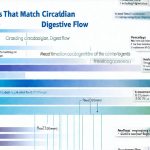Bloating is an incredibly common digestive complaint, affecting millions worldwide. It’s often characterized by a feeling of fullness, tightness, and sometimes even pain in the abdomen. While many attribute it to specific foods, the timing of our meals can play just as significant a role. Understanding how your body processes food throughout the day and aligning your eating habits accordingly isn’t about restrictive dieting; it’s about working with your natural digestive rhythm to minimize discomfort and promote optimal gut health. This article will explore the best times to eat – and what to avoid around those times – to help you reduce bloating and feel more comfortable after meals.
The human body operates on internal clocks, known as circadian rhythms, that govern many physiological processes, including digestion. These rhythms influence everything from hormone production to enzyme release. When we disrupt these natural cycles through irregular eating schedules or poor timing choices, our digestive system can become overwhelmed, leading to bloating, gas, and other unpleasant symptoms. Simply being mindful of when you eat, rather than just what you eat, can make a substantial difference in how your body tolerates food and reduces the likelihood of experiencing uncomfortable bloating. You might even find that adjusting best meal timing helps with reflux too.
Understanding Your Digestive Timeline
Digestion is far from a passive process; it’s a complex series of events that unfolds over several hours. The moment food enters your mouth, digestion begins with enzymes in saliva breaking down carbohydrates. As food travels to the stomach, it’s further broken down by gastric acids and enzymes. This partially digested food then moves into the small intestine, where most nutrient absorption occurs. Finally, undigested material passes into the large intestine for water absorption and eventual elimination. Each stage requires specific conditions and optimal timing. Eating too quickly, consuming large meals late at night, or combining certain foods improperly can all disrupt this delicate process.
The stomach typically empties about 4-5 hours after eating a meal, but this time varies based on the size and composition of the meal. High-fat meals take longer to digest than those rich in carbohydrates or protein. Understanding this timeline is crucial for planning your eating schedule. For example, if you know you’re prone to bloating, avoiding large, fatty meals right before bedtime can significantly reduce discomfort overnight. The goal isn’t necessarily to avoid these foods entirely but rather to consume them at a time when your body has sufficient time and resources to properly digest them. Perhaps consider zero-acid beverages instead!
Furthermore, our digestive enzyme production fluctuates throughout the day. Generally, enzyme activity is highest during daylight hours when we are most active, allowing for more efficient digestion. This explains why many people find it easier to digest larger meals earlier in the day and experience discomfort if they attempt to do so closer to bedtime. Prioritizing nutrient-rich foods and smaller portions when digestive capacity is naturally lower – like later in the evening – can help minimize bloating. And understanding best time to eat dinner can be a game changer.
Meal Timing for Optimal Digestion
Timing your meals strategically isn’t about strict rules; it’s about finding what works best for your body. However, here are some general guidelines to consider:
- Breakfast within one hour of waking: This helps kickstart your metabolism and sets the tone for a day of efficient digestion. Skipping breakfast can often lead to overeating later in the day.
- Lunch around midday: Lunch provides sustained energy throughout the afternoon and allows sufficient time for digestion before dinner. Avoid overly large lunches, especially if you’re prone to bloating.
- Dinner at least 2-3 hours before bedtime: This is perhaps the most important timing consideration. Allowing your body ample time to digest before lying down minimizes reflux and reduces overnight bloating. Eating a heavy meal right before bed forces your digestive system to work while you’re trying to sleep, which can lead to discomfort and disrupted sleep patterns.
- Snack smart: If you need snacks between meals, choose easily digestible options like fruits, vegetables, or a small handful of nuts. Avoid sugary or processed snacks, as they can contribute to bloating. Anti-reflux snacks are great too!
Consistent meal times are also beneficial. Regular eating schedules help regulate your digestive system and optimize enzyme production. Even if you occasionally deviate from your schedule, aim for consistency most days of the week. This predictability aids in efficient digestion and reduces the likelihood of experiencing bloating. Thinking about taking a walk after eating could also help!
Food Combinations & Bloating Triggers
Certain food combinations can exacerbate bloating in some individuals. While there’s no one-size-fits-all answer, understanding potential triggers can help you make informed choices. For example:
- Combining large amounts of fruit with protein or fats can slow down digestion and cause fermentation in the gut, leading to gas and bloating. Fruits digest quickly, while proteins and fats take longer; this mismatch can create digestive stress.
- Pairing cruciferous vegetables (broccoli, cauliflower, cabbage) with high-fat foods can also be problematic for some people. These vegetables naturally produce sulfur-containing compounds that can cause gas, and fat slows down digestion further.
- Consuming dairy products alongside other food groups, especially if you have lactose intolerance or sensitivity, can lead to bloating and discomfort.
It’s important to identify your personal triggers through mindful observation. Keep a food diary and note when you experience bloating after eating specific combinations. This will help you pinpoint which foods are causing issues and adjust your diet accordingly. Elimination diets – temporarily removing suspected trigger foods from your diet and then reintroducing them one at a time – can also be helpful in identifying sensitivities.
Hydration & Movement: Supporting Digestion
Beyond meal timing and food combinations, two other factors play crucial roles in preventing bloating: adequate hydration and regular physical activity. Water is essential for optimal digestion; it helps soften stool, prevents constipation (a major contributor to bloating), and supports the movement of food through the digestive tract. Aim to drink at least eight glasses of water per day, and even more if you’re physically active or live in a hot climate.
Physical activity also promotes healthy digestion. Exercise stimulates intestinal contractions, which help move waste through the digestive system. Even a short walk after meals can significantly reduce bloating. Furthermore:
- Avoid carbonated beverages, as they introduce excess gas into your digestive system.
- Chew your food thoroughly – this helps break down food particles and reduces the amount of air you swallow.
- Practice mindful eating – pay attention to your body’s hunger and fullness cues, and avoid rushing through meals.
- Consider incorporating probiotic-rich foods (yogurt, kefir, sauerkraut) into your diet to support a healthy gut microbiome. A balanced gut microbiome is essential for efficient digestion and reduced bloating. If you are traveling, remember these tips!
Ultimately, preventing bloating isn’t about deprivation or following rigid rules; it’s about understanding your body’s unique digestive needs and making informed choices that support optimal gut health. By paying attention to meal timing, food combinations, hydration, and movement, you can significantly reduce discomfort and enjoy a more comfortable and balanced relationship with food. Best types of bread can also play an important role in your diet!


















